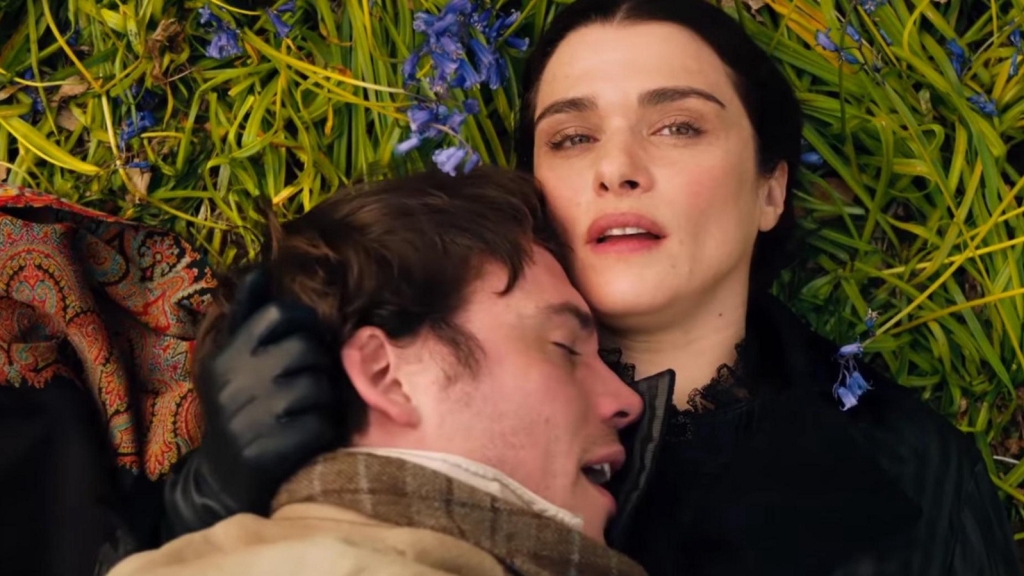It always stuns me how the same text could be read so differently depending on our internal state of affairs and the external passage of time. Roger Michell’s My Cousin Rachel (2017) after a year’s gap in viewing looks to be another story. Altogether.
What I got from it at first was sexual politics, an unorthodox match (for the 19th century, or any century in a patriarchal frame) – an older woman and a younger man – the tense dynamics of their power play, a looming sense of betrayal due to actual danger or a possible horrible misunderstanding.
What still holds for me is its sophisticated exploration of the consequences of an active and complex female sexuality in what polite society designated to be a woman’s timid, matronly years. In one brief exchange the young Philip (a tuned in, brooding Sam Claflin) describes the differences in femininity between Rachel and another lady, close to her in age, as liking to look at Rachel, while not so much liking to look at Mrs so-and-so. A pretty chilling male gaze observation, more so because it’s always current.
And Rachel, smart and worldly, played gracefully & enigmatically by Rachel Weisz, knows full well that people like to look at her. She probably made a living out of it.
Now, and with a fresh set of goggles, the ill-fated relationship seems to be merely the departure not the destination, the anti-climatic tryst itself making way for a rather sombre study of cultural prejudice and misogyny, one that still could be taken as relevant a hundred years plus change fast-forward.
The gist of my second viewing experience is that Rachel gets punished for who she is, and what that is remains very open to interpretation. Diegetic, or otherwise.
Not present yet omnipresent in the first twenty minutes of the film, gossiped about and effectively demonised, the exotic Mediterranean widow (only half-Italian! – a character exclaims) now arrives destitute at the grand Cornish estate she could have inherited, but didn’t. Her deceased husband’s nephew, the heir, is already hellbent on hating her. He suspects her of murdering his uncle, and other things. Like being a woman, and being foreign.
A lady of her ilk and ill fortune does not have many other options in this set-up but to charm her way in. Which she does, deliciously.
Did she, or didn’t she? This is the hamletesque question Philip repeats to himself as mantra. Whether along with being a temptress (she was), she was also a poisoning murderess (most likely not).
Philip’s initial suspicions, based on the last written ramblings of his uncle, subside in the glow of her translucent beauty and poise. But that unbridled passion quickly reverts to rage when he realises that his affections are not adequately returned. After going all out for the lady he is infatuated with, she is tender and obliging, but somehow absent from the frame.
There is a caveat, Philip gives everything so he can get everything. A genuine, sweet, but inherently selfish mode of love. And Rachel, calculating yet touched, worn down by love, more than anything else in the world, wants to be free. And now she can be.
What Philip perceives as full rejection first makes him ill, and then drives him mad. All the while she makes him Italian herbal teas. This is unfortunate. His ingrained prejudice against Rachel’s otherness starts rearing its bigoted head, and this I took away as the engine of her demise. His initial narrow-minded attitude towards everything foreign, a casual imperiousness in communication, becomes a full-blown ‘burn the witch’ sentiment. He buys into the projections.
Rachel, the murderous hag from a strange land, transitions to goddess that can do no wrong, then slowly is demoted to deceitful whore and, when full paranoia sets in – emerges as poisonous witch. All the time an object of obsession, never a fellow human, her actions continually measured by the standards of the dominant culture, and deemed suspect when they do not adhere.
Rachel’s true tragedy, the reason her young lover’s anger management issues turned from throat-grabbing violent to homicidal, was down to a basic misunderstanding of her being, her foreignness; her different little ways, a style of femininity encoded in a unfamiliar fashion, the strangeness of the language she sometimes spoke… A whole world of enchanting detail that Philip could not translate and reference suddenly becoming a sinister trap. Everything Rachel did spelled deceit to him, and consequently to us, the complicit viewers. To frame something means everything.
If Rachel had been understood, she might have lived. The last-minute discoveries were stacked in her favour. She even found love for her fickle, obsessed paramour in the end. A post-mortem testament to her decency flashes by, on-screen, in ten seconds.
Pre-credits, and closing, the taciturn Philip seems a particularly sedate husband to his English wife – a young lady waiting in the wings while the Rachel affair went down, a good mate rather than a crazy love. One which he still obsesses over, now guilt-ridden.
This unexpected, muted colonial narrative to the original Daphne du Maurier tale took me by surprise. The film matured for me in this one year. Subjective analysis this might well be, but the final fatal prejudice is there in the story for all to see, clear and cutting. A hidden sharp edge beneath a velvety veneer.
★★★✩✩
Author: ©Milana Vujkov
